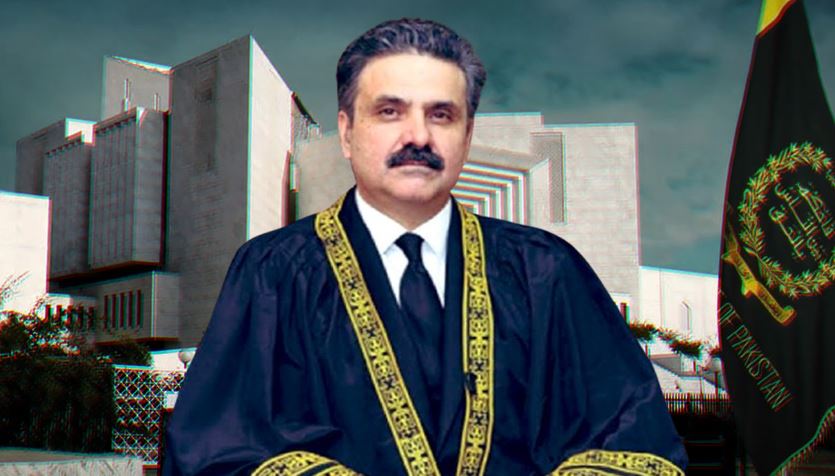Ahmed Nadeem Cheema
On October 26, 2024, Mr Justice Yahya Afridi took the oath to become the 30th Chief Justice of Pakistan, a role that places upon him the responsibility to instigate profound reforms within the nation’s judicial system. His ascension follows a period marked by contentious practices, notably the formation of benches comprised of judges sharing similar ideological leanings, a trend that must be confronted head-on. His efforts to restore the original structure of the Supreme Court Practice and Procedure Committee, which had been altered by former Chief Justice Qazi Faez Isa at the behest of undisclosed influences, mark the initial steps towards a more transparent and impartial judiciary.
Justice Qazi Faez Isa’s unilateral decision to exclude his own appointee, Justice Munib Akhtar, from the judges’ committee — replacing him with Justice Amin-Ud-Din Khan, who ranked lower in seniority — raised serious concerns regarding judicial integrity. Such maneuvering effectively undermined the Supreme Court (Practice and Procedure Act), 2023, which had received broad support from the Full Court. This breach not only altered the intended balance of the committee but also contradicted earlier affirmations made by Justice Isa concerning the independence of the judiciary. Justice Syed Mansoor Ali Shah’s resolution to refrain from participating in the manipulated committee highlights the necessity of maintaining judicial independence against external political influences.
Under Justice Afridi’s leadership, the reintegration of Justice Akhtar into the Practice and Procedure Committee signifies a commitment to uphold judicial values. The full court meeting convened on October 28, 2024, with all judges participating, including Justice Shah via video link, further reinforces the new Chief Justice’s stance against populism and undue external pressures. Afridi’s distinguished legal career and profound understanding of the challenges confronting the judiciary position him well to champion fundamental rights and enforce the rule of law.
Justice Afridi’s candid acknowledgment of the various maladies permeating the judicial system underscores the pressing need for structural reforms. The current judicial framework, deeply rooted in colonial legacy, is outdated and inadequate for contemporary needs. The evidence is clear-a comprehensive overhaul of the judicial infrastructure is urgently required. This task demands both depth of knowledge and an unwavering commitment to change.
One pressing issue that the new Chief Justice must address pertains to the ongoing military trials of innocent individuals related to the events of May 9-10, 2023. Justice Afridi’s earlier ruling in Jawwad S. Khawaja v Federation of Pakistan has illuminated the constitutional breaches occurring under military jurisdiction, highlighting the need for immediate intervention to safeguard citizens’ rights under Article 10A of the Constitution. The protection of fundamental rights and the supremacy of the Constitution are paramount, and the Chief Justice’s commitment to resolving cases that infringe upon these principles is reassuring.
Moreover, the need for swift adjudication of cases is a critical component of the judicial reform agenda. The prolonged timelines for case resolutions have become emblematic of a system where justice is often delayed, translating into justice denied. The existing mechanisms, which reflect archaic procedures, must be replaced with more efficient practices, including the adoption of electronic systems for case filings and expedited proceedings. The global trend towards modernizing judicial frameworks is a clear signpost, and Pakistan must follow suit to ensure timely justice.
Judicial reforms should aim not only at expediting case resolution but also at minimizing unnecessary litigation. Currently, the government at both federal and provincial levels stands as one of the leading litigants, often undermining the rights of citizens. This pattern must be scrutinized and amended to mitigate undue burdens placed on individuals pursuing justice. Establishing a dedicated commission to investigate the causes behind this trend, and formulating actionable strategies to address these issues, could significantly alter the dynamics present in the current system.
Overall, the aim of judicial reforms under Justice Yahya Afridi’s leadership should hone in on creating a system that favors efficient and fair dispute resolution over protracted litigation. Ensuring that state actors operate within a legal framework will not only protect citizens’ rights but also foster public trust in the judicial process.
In conclusion, Justice Afridi’s appointment heralds an opportunity to instate significant reforms essential for rejuvenating Pakistan’s judiciary. By addressing the aforementioned issues — the restoration of judicial independence, timely resolution of cases, reduction of unnecessary litigation, and empowerment of fundamental rights — the Chief Justice can pave the way for a more robust, equitable, and efficient justice system. His actions in the coming years will be pivotal in transforming the judiciary from an outdated institution into a pillar of upholding the rule of law and protecting the rights of all citizens. As he embarks on this critical journey, the nation watches with hope for a judicial renaissance that reflects both integrity and progress.
















